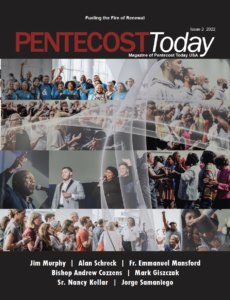11th Sunday in Ordinary Time
Meditation and Questions for Reflection or Group Discussion
Mass Readings:
1st Reading Ezekiel 17:22-24
Responsorial: Psalm 92:2-3, 13-168
2nd Reading: 2 Corinthians 5:6-10
Gospel: Mark 4:26-34
Without parables he did not speak to them. (Mark 4:34)
Did you know that you are quirky? It’s true. The fact that you are taking time out to read these words—and, most likely, to read the Scriptures from today’s Mass—sets you apart as unusual. Not too many people set aside time for prayer, after all.
But your quirkiness doesn’t end there. Do you go to Mass on Sundays? How odd! You could be sleeping in, like a lot of other people. Or getting up early to go fishing. Or any number of other things. Even if you went to Mass yesterday, that’s a peculiar way to spend a night off. There are restaurants to visit, movies to see, and TV shows to watch. But there you go, gathering with a bunch of other quirky people to sing to God and eat his Body and drink his Blood.
It gets worse. Do you forgive people from the heart—or at least try to? Do you try to see God in the people around you? How about going into a small booth and telling a man all of your sins? Who does those things?
Of course, you’re not really quirky. You’re only doing what God created you to do: love him and love your neighbor. But to many people, you are a mystery. And that’s exactly how Jesus wants it.
St. Mark tells us that Jesus himself spoke in riddles and parables to the people around him—he even mystified his closest disciples! This was part of his strategy: to provoke his listeners to think more deeply about God and about their lives. He wanted to awaken in them a hunger for God so that they would come ask him for more. Then, when they were ready, he could open their hearts to the “mystery of the kingdom of God” (Mark 4:11).
So keep being quirky! Love. Forgive. Pray. Give. Then, when someone asks why you are the way you are, tell them you’re just trying to be like Jesus. Who knows? You may win them over.
“Jesus, help me to reflect your love today.”
Download this reflection with discussion questions here.(Many thanks to The Word Among Us (www.wau.org) for allowing us to use meditations from their monthly devotional magazine. Used with permission.)
Sunday, June 17, 2018
Questions for Reflection or Group Discussion:
- The first reading begins with these lofty words: Thus says the Lord GOD: I, too, will take from the crest of the cedar, from its topmost branches tear off a tender shoot, and plant it on a high and lofty mountain; on the mountain heights of Israel I will plant it. It shall put forth branches and bear fruit, and become a majestic cedar. Birds of every kind shall dwell beneath it, every winged thing in the shade of its boughs. The reading ends with these challenging words: And all the trees of the field shall know that I, the LORD, bring low the high tree, lift high the lowly tree, wither up the green tree, and make the withered tree bloom. As I, the LORD, have spoken, so will I do.
- What do you think the lofty opening verses and the challenging closing verses mean? How do you think they relate to each other?
- How do they apply to how we are to live our lives? How are you doing?
- The responsorial psalm opens with these words: It is good to give thanks to the LORD, to sing praise to your name, Most High, to proclaim your kindness at dawn, and your faithfulness throughout the night. Like the first reading, it also speaks of trees (our lives) that are planted and flourish and bear fruit even in old ag
- How would you describe the “kindness” and “faithfulness” of the Lord in your life?
- How much time do you spend each day to “give thanks” and “sing praise” to the Lord for this kindness and faithfulness? What are some additional steps you can take to increase this time?
- Are the ending words of the psalm a source of encouragement or discouragement to you? How do you believe God is calling you to “flourish” and “bear fruit” for him “in the house of the Lord”?
- In the second reading, we hear these uplifting and inspiring words of St. Paul: Brothers and sisters: We are always courageous, although we know that while we are at home in the body we are away from the Lord, for we walk by faith, not by sight. Yet we are courageous, and we would rather leave the body and go home to the Lord. Therefore, we aspire to please him, whether we are at home or away. For we must all appear before the judgment seat of Christ, so that each may receive recompense, according to what he did in the body, whether good or evil.
- What do these words, “we walk by faith, not by sight” mean to you?
- How do these words relate to the ending words of the reading, “we must all appear before the judgment seat of Christ, so that each may receive recompense, according to what he did in the body, whether good or evil”?
- In what areas of your life do you tend to walk by sight, not by faith? What steps can you take to change this?
- The Gospel reading presents two parables about the Kingdom of God. The first one speaks of a man who scattered seed on the land and ends with these words: Of its own accord the land yields fruit, first the blade, then the ear, then the full grain in the ear. And when the grain is ripe, he wields the sickle at once, for the harvest has come. The second one speaks of the sowing of a mustard seed: the smallest of all the seeds on the earth. It ends with these words: But once it is sown, it springs up and becomes the largest of plants and puts forth large branches, so that the birds of the sky can dwell in its shade.
- If someone were to ask you to describe the meaning of these parables, how would you answer them?
- How do they apply to your life?
- The meditation is a reflection on these words from the Gospel reading: Without parables he did not speak to them. It includes these words: “ Mark tells us that Jesus himself spoke in riddles and parables to the people around him—he even mystified his closest disciples! This was part of his strategy: to provoke his listeners to think more deeply about God and about their lives. He wanted to awaken in them a hunger for God so that they would come ask him for more. Then, when they were ready, he could open their hearts to the mystery of the kingdom of God.”
- Why do you think Jesus used parables so often in his teachings?
- Do Jesus’ parables “provoke” you to “think more deeply about God” and about your life; do they “awaken” in you “a hunger for God” so that you “would come ask him for more”; and do they “open” your heart to the “mystery of the kingdom of God”? Why or why not?
- What are some new ways you can study Jesus’ parables in your daily prayer and walk with the Lord?
- Take some time now to pray and ask the Lord to allow you to experience more deeply his great love for you so that you can share it and reflect it others? Use the prayer below from the end of the meditation as the starting point.
“Jesus, help me to reflect your love today.”
[The discussion questions were created by Maurice Blumberg, who is currently a member of the board of directors of the ChristLife Catholic Ministry for Evangelization (www.christlife.org) and a member of the National Service Committee Council of the Catholic Charismatic Renewal (www.nsc-chariscenter.org). Maurice was also the founding executive director of the National fellowship of Catholic Men, a chairman of the board of The Word Among Us (www.wau.org), and director of partner relations for The Word Among Us Partners ministry. He can be contacted at (Enable Javascript to see the email address) mblumberg@wau.org or mblumberg@aol.com.]

 Click Here for us to pray for your intentions through our new website.
Click Here for us to pray for your intentions through our new website. 
